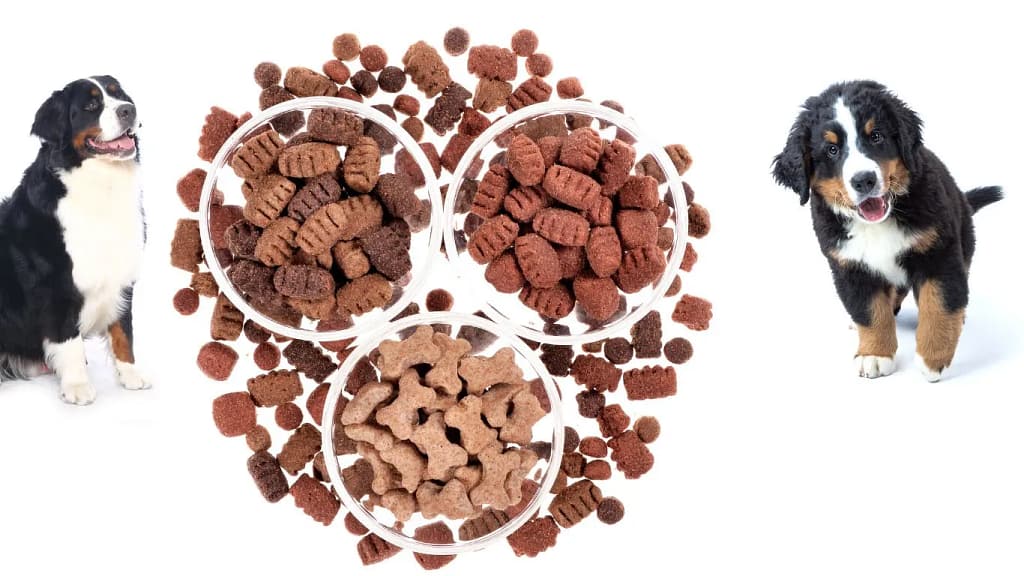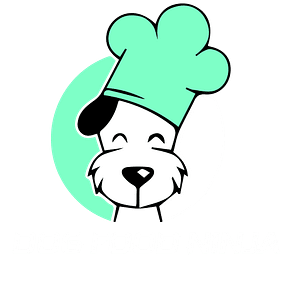Numerous dog food brands are available, and they’re not all created equal. If you have a new puppy at home,
Puppy and dog food are specially formulated to meet the nutritional needs of dogs at different stages of life. This article breaks down the ingredients and nutrients that each type of dog food provides,

Table of Contents
ToggleWhat Distinguishes Dog Food From Food For Puppies?
Dogs and puppies have different nutritional needs. Puppies need less protein than adult dogs, which their digestive systems can’t handle well. This difference can be seen in the size of the food you feed them: puppy kibble is more diminutive than adult dog kibble. Young puppies are also able to eat more frequently than adults.
Puppy food has a higher calorie content than dog food because puppies are still growing and need more energy to maintain the process. Puppy food also contains more protein and fat than dogs, which works to help puppies form muscle and bone.
Puppy food has higher levels of nutrients than adult dog food. For instance, a puppy’s milk contains more calcium and phosphorus for bone and tooth development. Puppies also have more omega-3 fatty acids, which are essential for proper brain development.
What A Puppy Consumes While It Is Still Growing
Regarding food, puppies have different nutritional needs than adult dogs. Puppies need more calories, fat, and protein to support their rapid growth. They also require vitamins and minerals like calcium and phosphorus for healthy bone formation.
Usually, puppy food has more calories than adult dog food. It’s also higher in fat and protein to help support a puppy’s growth. Puppy food also has higher levels of certain nutrients, like calcium and phosphorus, for proper bone development.
A diet of quality puppy food will benefit the majority of puppies. Yet, some people may need more or less, depending on their particular demands. You should always decide on the ideal diet for your puppy in consultation with your veterinarian.
When To Switch Puppypuppy To Dog Food
Now that your pup is a bit older, you may wonder when to switch from puppy food to dog food. Change is the overall guideline around the one-year mark. Each dog is unique, so talk to your veterinarian about the ideal feeding plan and type of food for your four-legged friend.
Here are a few things to remember when switching from puppy chow to adult kibble. First, start by slowly mixing the two types of food, gradually increasing the amount of adult food while decreasing the puppy food.
This transition period will help your pup’s stomach adjust to the new type of food. Second, make sure you’re getting high-quality dog food that meets all of your pet’s nutritional needs.
And lastly, don’t forget to continue monitoring your pup’s eating habits and weight – an unhealthy appetite or sudden weight loss could be a sign that something’s wrong.
When To Stop Feeding Puppy Food Ample Breed
At what age do you transition a large breed puppy to adult food? The general rule of thumb is to switch at 12 months old or when your pup reaches 80% of its expected adult weight.
But every dog is different. If your large-breed puppy is proliferating and filling out its frame, you may need to switch to adult food sooner.
If your pup is a little smaller than average or isn’t developing as quickly as you’d expected, you might want to hold off on the transition for a little while. Of course, before changing your dog’s diet, consult your veterinarian.
When in doubt, err on caution and stick with puppy food a little longer. It’s better to give your pup extra time to grow and mature before switching to adult food.
When To Switch Puppypuppy To A Dog Food Science Diet
The time to switch your PuppyPuppy to dog food depends on several factors. The size of your, the breed of your Puppy, and how much your Puppy weighs are all critical considerations.
A small-breed puppy can be switched to adult dog food as early as nine months old, while a large-breed puppy may need to stay on puppy food until 12–14 months old. Some giant breeds may even need to keep on puppy food until they are 18–24 months old.
Fast-growing breeds or those predisposed to joint problems may benefit from staying on puppy food for longer. You should consult a veterinarian if you are worried about switching your particular breed of puppy to adult dog food.
Weight: As a general guideline, puppies should be at least 50% of their expected adult weight before being switched to adult dog food. So, if your PuppyPuppy is expected to weigh 30 pounds as an adult, it would need to consider at least 15 pounds before making the switch.
Remember, every Puppy is different, and it’s important to talk to your veterinarian about the ideal moment for your dog to go from puppy food to dog food.
Dog Food Age Chart
When selecting the quantity and type of food to feed your dog, your pet’s age is an essential factor. In general, puppy food is formulated to meet the higher energy needs of growing dogs, while adult dog food is designed for maintenance.
Here is a close inspection of the critical distinctions between puppy food and dog food, as well as tips on when to switch from one to the other.
Puppy Food: Puppies have small stomachs but high energy needs, so they need a diet packed with nutrients. Puppy foods are typically higher in calories than adult dog foods, and they also contain more protein and fat to support growth. Puppy food may also have omega-3 fatty acids essential for brain development.
Adult Dog Food: Once your pup reaches adulthood (usually around one-year-old, he can start transitioning to adult dog food. These formulas are lower in calories and fat and sometimes contain added fiber to help digestion. Adult dog foods may also include joint-supporting ingredients like glucosamine and chondroitin sulfate.
Making the Switch: It’s essential to make the transition from puppy to puppy.
What Is The Difference Between Puppy Food And Small Dog Food?
The nutritional requirements of growing puppies are met by puppy food, while small dog food is formulated for the specific dietary needs of smaller adult dogs. Puppy food is typically higher in calories and protein than small dog food to support a puppy’s rapid growth.
Smaller breeds of dogs tend to have higher energy needs than larger breeds, so small dog food may be slightly higher in calories than regular adult dog food. Both puppy food and small dog foods contain essential nutrients like proteins, fats, carbohydrates, vitamins, and minerals.
Conclusion
The food is designed to meet the nutritional needs of puppies as they grow and develop. On the other hand, dog food is formulated for adult dogs and contains different nutrients than puppy food. Puppies need more calories, protein, fat, and specific vitamins and minerals than adult dogs, so feeding them a diet tailored to their needs is essential. If you’re unsure about which type of food to feed your pup, talk to your veterinarian for guidance.
FAQs
What Happens If A Puppy Eats Grown Dog Food?
If a puppy eats grown dog food, it might not get the proper nutrients it needs and could become sick. It is best to feed them puppy food so they can get all the nutrients they need to grow up healthy and strong.
How Long Do Puppies Poop After Eating?
It generally takes puppies about 12 hours to poop after eating. However, this can vary depending on the puppy’s age, weight, and health. Please consult your veterinarian if you are concerned about your puppy’s bathroom habits.
When Can I Switch My Puppypuppy To Regular Dog Food?
You can usually switch your PuppyPuppy to regular dog food around 6-8 months old. You will want to check with your veterinarian to ensure that your puppy is on a diet appropriate for its age, breed, and activity level.

